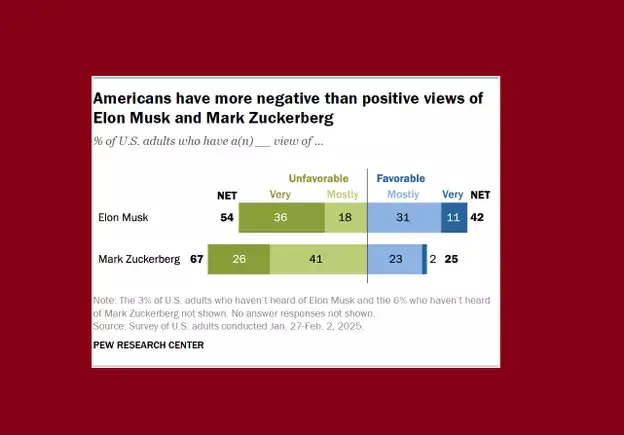As the digital landscape transforms, the figures steering these changes—namely Elon Musk and Mark Zuckerberg—find themselves under an intense microscope of public scrutiny. Recent findings from Pew Research reveal a significant shift in how Americans view these tech moguls. This article peels back the layers of their growing unpopularity and examines the implications of their actions within the broader societal context.
According to the Pew Research survey conducted earlier this year, opinion towards both Musk and Zuckerberg has soured dramatically. A startling 54% of U.S. adults reported a generally unfavorable view of Elon Musk, with 36% of respondents describing it as “very unfavorable.” This contrasts sharply with Zuckerberg, whose unfavorable rating has reached a staggering 66%, including 26% who feel “very unfavorable.” While both figures exhibit significant disapproval, it appears that Musk is particularly affected by a distinct segment of vehement critics, who profoundly dislike him compared to Zuckerberg’s broader yet somewhat milder detraction.
The implications of such sentiments reveal that the increasing public disdain for these influential personalities transcends mere discontent. It reflects deeper societal concerns regarding their influence and decision-making, especially as it becomes intertwined with political and social issues.
The Villains of the Digital Age?
There is a growing narrative framing Musk and Zuckerberg as antagonists in the tech industry. Both figures have sparked considerable ire with actions perceived as self-serving or reckless. Musk’s controversial political commentary, fractious relationship with family—most notably disowning his daughter—and the transformation of Twitter into a platform echoing his personal viewpoints contribute to the adverse perceptions surrounding him.
Conversely, Zuckerberg’s tenure at Meta has not been without scandal. Accusations of exploiting user data have plagued his reputation, alongside a series of high-profile blunders regarding misinformation and mental health ramifications from his platforms. Not to mention, his land acquisitions in Hawaii have ignited local outrage. These actions paint a picture of two billionaires whose legacies are being overshadowed by their decision-making—often viewed as self-serving rather than benefitting society.
With immense wealth and influence comes the inevitable scrutiny of decisions made by leaders like Musk and Zuckerberg. Their vast fortunes afford them the ability to reshape industries and entirely redefine societal norms, yet it also magnifies their responsibility to the public. The prevalent sense of dissatisfaction towards their actions is exacerbated by their evident disregard for regulations that are designed to ensure consumer protection and societal welfare.
It is crucial to note that while regulations may impinge on their visions for expansion, they exist to safeguard public interest. The impact of their decisions often reverberates across various sectors, affecting countless lives—a reality that they appear to overlook in their pursuit of dominance. Their relentless ambitions raise pivotal questions about ethical boundaries in entrepreneurship and the social obligations of corporate leaders.
The Long-Term Outlook: Visionaries or Villains?
As we consider the long-term repercussions of Musk and Zuckerberg’s legacies, contrasting visions emerge. While they may indeed be remembered as innovative minds who spurred advancements in technology, the potential for them to be vilified for their negative impacts is equally plausible. The trajectory of their public personas hangs in the balance.
Some may argue that their technological contributions justify their questionable methods; others fear the societal implications of unregulated power wielded by such individuals. What remains important is the existence of checks and balances—ensuring that the power dynamics favor progress without sacrificing humanity in the process.
The waning public favor for Elon Musk and Mark Zuckerberg serves as a critical reminder of the delicate interplay between innovation and accountability. As they strive to leave their mark on the world, the confrontation between ambition and ethical obligations will shape not only their legacies but also the technological landscape of tomorrow. The discourse surrounding these tech titans is far from settled, and the path forward grows increasingly complex as societal expectations evolve.


Leave a Reply